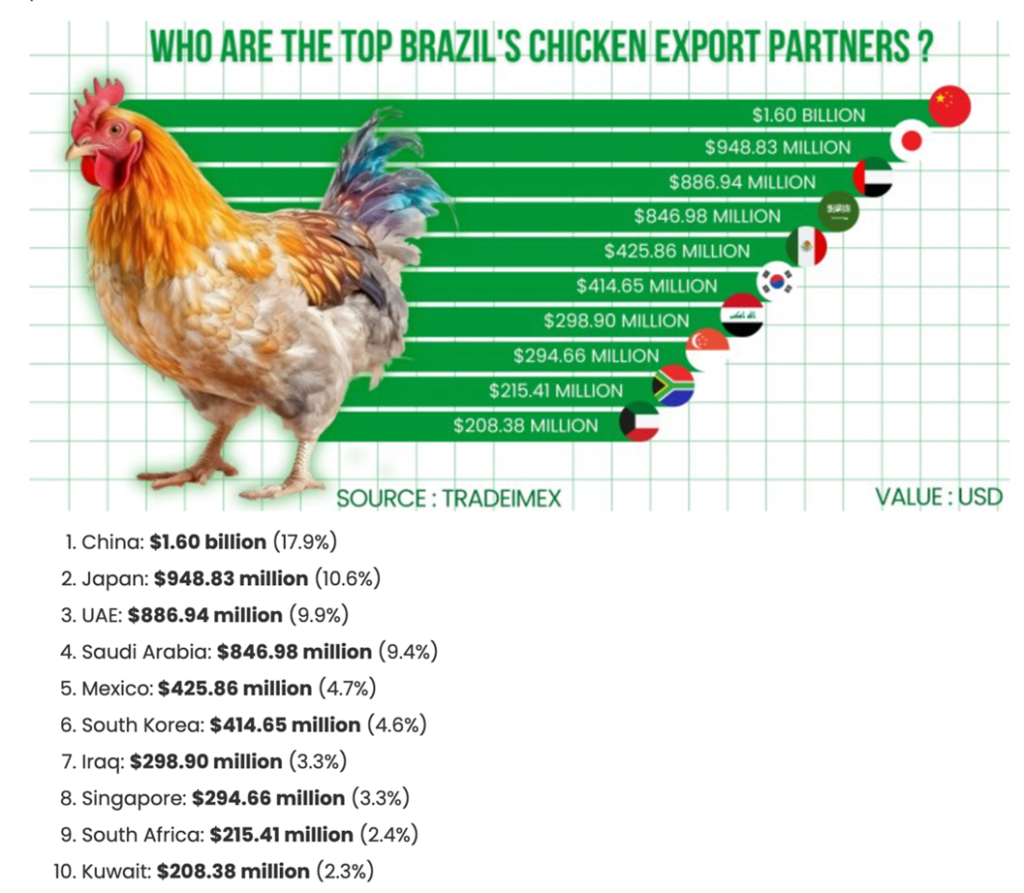Locations Affected: Brazil
Brazil, the world’s largest chicken exporter, confirmed a bird flu outbreak on a poultry farm in Montenegro on 16 May. The outbreak has triggered trade bans and restrictions by various countries, including Argentina, China, Mexico, and South Korea. This is the country’s first confirmed outbreak of avian flu on a commercial poultry farm. The virus, identified as a highly pathogenic strain, has killed around 15,000 birds, and the farm has culled an additional 2,000.
Brazil exported approximately USD 10 billion worth of chicken meat and over five million metric tons of chicken products in 2024, accounting for about 35 percent of global trade. Top importers include China, Japan, Saudi Arabia, and the United Arab Emirates.

Brazil’s Chicken Export Partners (as of 2023)
Source: https://www.tradeimex.in/blogs/brazil-chicken-exports
What is Bird Flu?
Bird flu is a highly contagious viral disease that primarily affects birds. It can also infect mammals, including humans, through contact with the saliva, nasal secretions, and feces of infected birds, or with contaminated surfaces. However, the risk of human infection remains low.
Trade Restrictions and Health Investigations
- China, the European Union, Mexico, Chile, and Uruguay have issued a nationwide ban on poultry imports from Brazil, while Japan, Saudi Arabia, and the United Arab Emirates have limited their bans to imports from the affected state.
- The outbreak area in Montenegro has been isolated, and veterinary officials have launched an investigation within a 10 km radius to detect further cases. Seven disinfection barriers have been set up near the farm to clean and disinfect passing vehicles.
- On 17 May, the government of Minas Gerais state destroyed 450 metric tons of eggs from Rio Grande do Sul. Eggs traced back to the farm and delivered to locations in Paraná and Rio Grande do Sul will also be destroyed.
- Authorities have tightened sanitary controls in the affected area, including restricting visitor access and requiring chicken-feed deliverers to wear clean boots.
- Brazilian authorities aim to determine by 20 May whether the outbreak of avian flu among wild birds at a zoo in Rio Grande do Sul is connected to the outbreak on the farm, which is located 50 km from the zoo.
Outlook on the Situation
The rising number of bird flu cases globally has raised concerns among health experts, especially regarding the potential for transmission to humans. The current outbreak may reduce Brazil’s chicken exports by 10–20 percent, depending on how quickly it is contained and whether countries ease the imposed restrictions. Brazil will be considered free of bird flu if no new cases are confirmed within 28 days of the outbreak. However, the country will still need to negotiate with buyers to lift existing trade bans.
If the outbreak spreads further, as seen in the United States, the impact on Brazil’s poultry industry and local economies could be more severe, with more countries likely to impose stricter restrictions. As the world’s largest exporter of poultry products, a prolonged outbreak in Brazil could disrupt global supply chains and lead to higher poultry prices. Organizations are advised to stay updated on developments and prepare necessary contingency plans.


